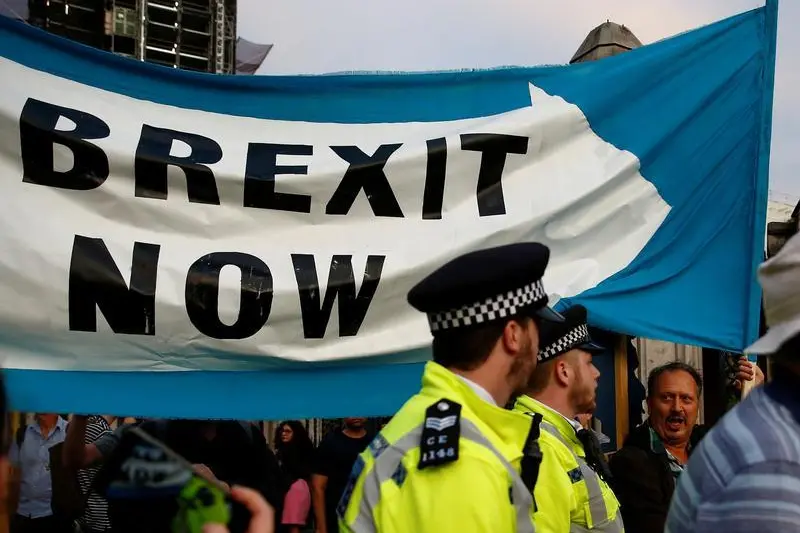PHOTO
Britain is in frenzy over Brexit. The country almost seems to be experiencing some kind of collective 'mid-life crisis'. Many economic and social decisions are on hold, and both major political parties, the Conservatives and Labour, are engaged in bitter infighting over whether, how and when to leave the European Union. Politics is decidedly domestic at present, so it is not surprising that there has been little discussion in Britain about how Brexit might affect the country's foreign policy.
Key international players, including Donald Trump, Vladimir Putin and the Chinese leadership, are eager for Brexit to proceed because they believe (correctly, in my view) that it will result in both a weaker EU and a weaker Britain, and hence boost their own global power and influence.
In order to encourage Britain to make a clean break with Europe, Trump has asserted that Brexit would enhance Britain's standing in the world.
Indeed we already see signs of a weakened Britain, as other countries test the UK's resolve. Iran seized a British ship in the Gulf in July and arrested 23 crew members. The British government called it "state piracy" but initially did little in response (though they announced on September 2 that they are now sending drones).
China continues to push back on its treaty with Britain guaranteeing rights and freedoms in Hong Kong - the UK only agreed to hand the territory to China (in 1997) on that basis. Yet the British response has been timid. Observers have noted that criticism of China over Hong Kong by Prime Minister Boris Johnson has been more muted than that by leaders in Australia and Canada, for example.
The UK may well continue to be immersed in domestic issues even after Brexit, not least because many in Scotland and perhaps also Northern Ireland may step up their campaigns to break away from the UK. They see Brexit as a form of English nationalism, rather than a British phenomenon. They don't want to be "England's last colonies".
Despite all this, the UK remains an important world power. It is one of five permanent members of the UN Security Council. It has (with France) one of the two strongest militaries in Europe. London will remain an important international financial capital. And British companies and media will continue to have global influence.
And what of the Middle East? Will Britain change its policies, post-Brexit? In some ways, perhaps yes. But it is worth remembering that even while the UK was in the EU there were sharp differences on key issues, most notably the 2003 Iraq war. The UK, along with Poland, Italy, the Netherlands and others, backed the American-led overthrow of Saddam, whereas France, Germany and other EU states rejected American calls to help.
On the questions of Iran, and the Israeli-Palestinian issue, however, the consensus Britain currently enjoys with the EU may change after Brexit.
On a visit to London last month, US national security adviser John Bolton said the US is enthusiastic about "no deal Brexit" and said the US may be prepared to sign quick trade deals with the UK, sector by sector, rather than wait for a comprehensive deal which may take years to conclude.
What Bolton did not make explicit is that the Trump administration, as part of these negotiations, may require the UK to fall into line with American positions on the Iranian regime.
This would please many who share Bolton's view that the EU-backed "Iran nuclear deal" increases not decreases the chances of Iran acquiring nuclear weapons in the medium term.
What would likely lead to a much more dramatic change to British Mideast policy, post-Brexit, is if Labour opposition leader Jeremy Corbyn comes to power, which he may well do if Johnson calls an early election in the coming weeks.
In the past Corbyn - who would be by far the most radical leftist leader Britain has ever had - has been a vocal supporter of the Islamic government in Iran, as well as the Iranian-financed Hamas and Hezbollah. Corbyn seems to admire any government so long they are anti-American. In the past he wrote a chapter in an "anti-imperialist" book defending the North Korean regime, and expressed admiration for East German communist leader Erich Honecker.
Even today Corbyn finds it difficult to criticise despots such as Vladimir Putin or Nicolas Maduro in Venezuela. A Corbyn government could see Britain move sharply away from the EU consensus on the Middle East and in effect adopt pro-Hamas, and pro-Iranian regime positions.
- Ashraq Al Awsat
Tom Gross is a British journalist specialising in the Middle East
Copyright 2019 Khaleej Times. All Rights Reserved. Provided by SyndiGate Media Inc. (Syndigate.info).





















